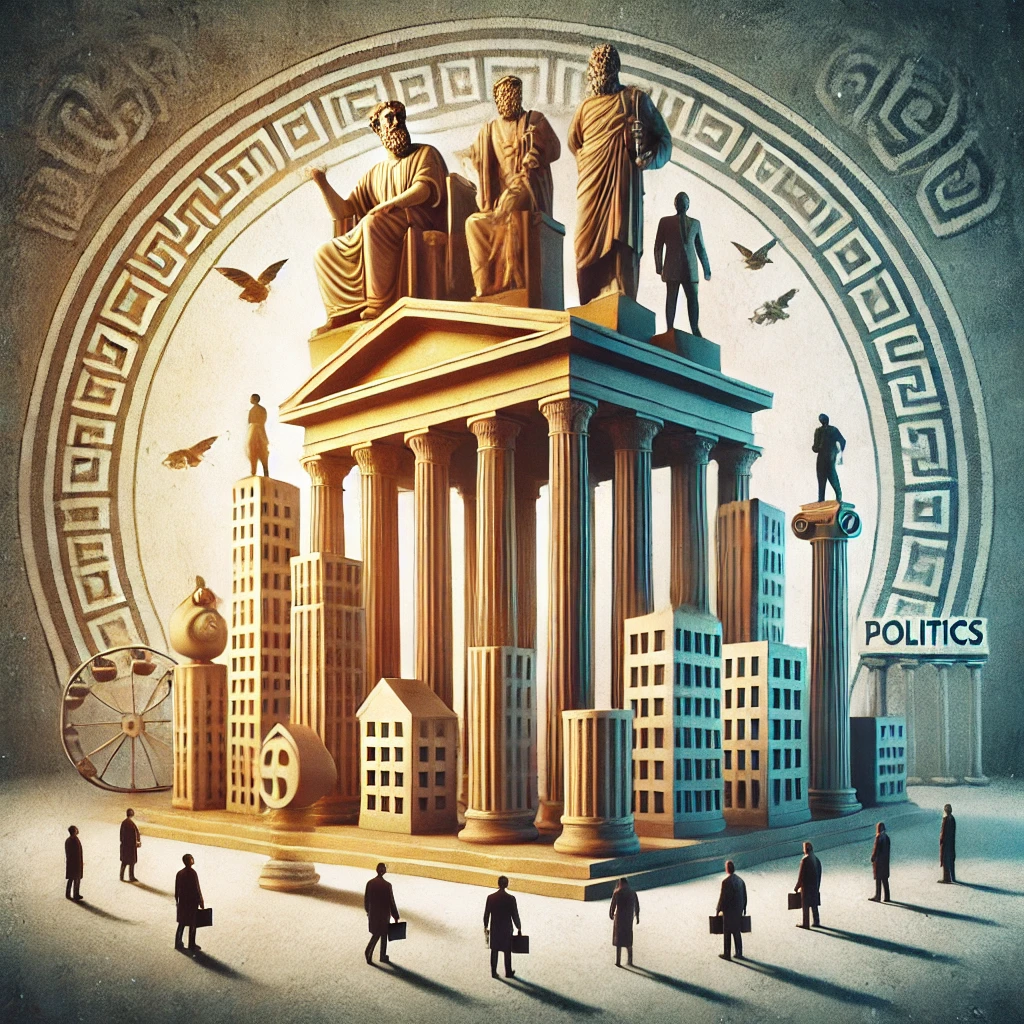Over two millennia ago, Aristotle delved into the complexities of governance, categorizing different regimes, their strengths, and their inherent weaknesses. Among his most profound analyses was his exploration of oligarchy—a system where power resides in the hands of a wealthy few. As we examine Aristotle’s reflections, it becomes difficult to ignore parallels with aspects of today’s Western societies. This contemplation invites crucial questions about how wealth and power are distributed and wielded, and whether we have overlooked or ignored the warnings embedded in these ancient insights.
Table of Contents:
- Understanding Aristotle's Oligarchy
- Modern Parallels: The Oligarchic Drift of Western Society
- Implications for Society: The Fragility of Oligarchies
- Reflecting on Our Path Forward: Urgent Questions for Modern Democracies
- The Timeless Relevance of Aristotle's Insights
Understanding Aristotle’s Oligarchy
Aristotle identified six types of government, divided into three “true forms” and their corresponding “corrupt counterparts.” These pairs included:
- Monarchy (true form) vs. Tyranny (perversion)
- Aristocracy (true form) vs. Oligarchy (perversion)
- Polity (true form) vs. Democracy (perversion)
In Aristotle’s philosophy, an oligarchy forms when wealth becomes the primary criterion for leadership, overshadowing virtues like wisdom, merit, and commitment to the common good. Unlike an aristocracy, where the most capable are chosen based on their excellence, oligarchs rise to power primarily because of their financial resources. This shift has profound consequences for the functioning of a society, as it perpetuates a system where social and economic barriers are reinforced, ensuring that power remains concentrated in the hands of a few.
Modern Parallels: The Oligarchic Drift of Western Society
In examining Aristotle’s analysis, it is hard not to draw comparisons between his conception of oligarchy and certain trends we observe in modern Western democracies. Although we pride ourselves on living in democratic systems that champion equality and meritocracy, a closer look reveals patterns eerily similar to those of an oligarchic structure.
1. The Dangerous Concentration of Wealth
The wealth gap in many Western nations has widened significantly over recent decades. A small percentage of the population controls a disproportionately large share of resources. This concentration of wealth gives the wealthy elite not only economic power but also disproportionate political influence. From tax policies that favor the wealthy to corporate lobbying, the link between wealth and political power has grown stronger.
Reflect on this: Does a small, wealthy minority have the ability to shape laws and policies to protect their interests at the expense of the broader population?
This subtle but critical question speaks to the heart of an oligarchy, where power is wielded by the few, and laws increasingly serve their interests. Whether through tax loopholes, corporate subsidies, or elite influence on economic policy, the wealthy continue to gain more political leverage, thus perpetuating a cycle where power is further consolidated.
2. The Influence of Money in Politics
Political campaigns are increasingly reliant on private funding, leading to a system where candidates are often indebted to their financial backers. This leads to an environment where corporations and wealthy individuals exert undue influence over the democratic process. Aristotle warned about this exact scenario—where the wealthy control the political machinery and governance becomes subservient to those with money.
Consider the modern dynamics of campaign financing. In the U.S., for example, Super PACs (Political Action Committees) and wealthy donors wield significant influence over political outcomes. This raises the question: In a society where campaign success is increasingly tied to wealth, can the true ideals of democracy flourish?
Such systems may lead to policies that prioritize the needs of a small group, neglecting the wider population’s needs—a clear reflection of oligarchic tendencies within democratic frameworks.
3. Barriers to Political Participation
Aristotle described how, in an oligarchy, financial resources become the gatekeeper to political power. In modern democracies, the high cost of running for office can deter capable individuals who lack financial backing. The result is a narrowing of representation, as only those with wealth or access to wealthy donors are able to realistically compete for political office.
What does it mean for a democracy when wealth becomes a de facto prerequisite for political participation?
In societies where running for office requires millions of dollars, the pool of potential candidates shrinks to the wealthy or those supported by them. This narrows political representation and limits the diversity of voices in leadership roles, reinforcing the grip of an elite class on governance.
4. The Revolving Door Between Public and Private Sectors
Aristotle was also acutely aware of how oligarchies intertwine wealth and power. One of the clearest modern examples is the revolving door between government and the private sector. High-ranking government officials often transition into lucrative positions in industries they once regulated, creating conflicts of interest. This dynamic undermines the integrity of public institutions and fosters a culture where policies are crafted to benefit private interests rather than the public.
Is the line between public service and private profit becoming too blurred?
Consider a high-ranking finance official moving to a position in a major bank or corporate leader transitioning into a key regulatory role. This overlap between government and industry diminishes accountability and strengthens the oligarchic tendency for laws and regulations to favor the powerful few over the collective good.
5. The Erosion of Social Mobility
In a true democracy, citizens should have a relatively equal opportunity to improve their economic standing. Yet, in modern Western societies, the rising cost of education, housing, and healthcare has made upward social mobility increasingly difficult. The result is a growing divide between the rich and poor, making it nearly impossible for those from lower economic backgrounds to break into leadership roles.
Has the promise of upward mobility faded?
When access to quality education and economic advancement is reserved for the wealthy, it perpetuates class distinctions and solidifies the power of the few. As Aristotle pointed out, this erosion of mobility results in a society where leadership is inherited, not earned—a direct path toward oligarchy.
Implications for Society: The Fragility of Oligarchies
Aristotle did not just analyze oligarchies—he also understood their inherent fragility. While an oligarchy might seem stable on the surface, its foundations are inherently unstable. The concentration of power and wealth creates deep societal divisions, often resulting in social unrest as marginalized groups grow increasingly disillusioned with a system that does not serve their interests.
The Threat of Polarization
The erosion of the middle class—traditionally seen as a stabilizing force in democracies—leads to increased polarization. This societal fragmentation opens the door to demagoguery and populist movements, as citizens, feeling disenfranchised, turn to leaders who promise quick fixes but may undermine democratic principles even further.
Aristotle warned that when oligarchies collapse, they often give way to even more unstable and corrupt regimes. Revolts against oligarchic structures may sometimes lead to democracies, but just as often, they devolve into tyrannies or new forms of oligarchy. This cycle of political decay raises critical questions:
- Are we witnessing the rise of new oligarchies in Western democracies?
- Will public discontent lead to lasting reforms or more dangerous political shifts?
Reflecting on Our Path Forward: Urgent Questions for Modern Democracies
Acknowledging these parallels isn’t about assigning blame, but about fostering a deeper understanding of the structural issues that challenge our democracies. Aristotle’s analysis of oligarchy offers timeless insights into the dynamics of power, wealth, and governance. In today’s world, where the political and economic landscape is increasingly shaped by a wealthy few, it prompts us to reflect on several key questions:
- How can we ensure that political power isn’t disproportionately influenced by wealth?
- What measures can we implement to promote greater social mobility and reduce economic disparities?
- In what ways can we reinforce the principles of meritocracy and the common good in our governance structures?
- How do we address the influence of money in politics without infringing on free speech or political participation?
Addressing these questions requires a collective effort. It involves policy reforms that increase transparency, limit the influence of money in politics, and promote equal opportunities. Reforms must focus on campaign finance, education access, and economic equality to create systems that ensure broad participation in the political process and economic progress for all citizens.
The Timeless Relevance of Aristotle’s Insights
Aristotle’s analysis of oligarchy serves as a profound reminder of the potential pitfalls in any political system. By reflecting on his insights, we gain valuable perspectives on our own societal structures, prompting us to remain vigilant in preserving the ideals of democracy. The future of Western societies depends on our ability to confront these issues head-on, ensuring that governance serves the many, not just the few.
The journey toward a more equitable society is ongoing. By learning from the wisdom of the past and critically examining our present, we can strive to build a future that aligns more closely with the principles of justice, meritocracy, and the common good.


